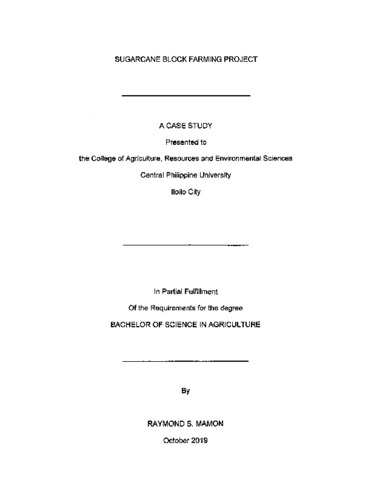Ipakita ang simpleng tala ng item
Sugarcane block farming project
| dc.contributor.adviser | Dusaran, Reynaldo N. | |
| dc.contributor.author | Mamon, Raymond S. | |
| dc.coverage.spatial | Negros Occidental | en_US |
| dc.date.accessioned | 2021-07-05T02:44:43Z | |
| dc.date.available | 2021-07-05T02:44:43Z | |
| dc.date.issued | 2019 | |
| dc.identifier.citation | Mamon, R. S. (2019). Sugarcane block farming project (Unpublished special paper). Central Philippine University, Jaro, Iloilo City. | en_US |
| dc.identifier.uri | https://hdl.handle.net/20.500.12852/1152 | |
| dc.description | Abstract only | en_US |
| dc.description.abstract | To address the issue on high poverty incidence especially in the Province of Negros Occidental, the Sugar Block Farm project of the Department of Agrarian Reform (DAR) and Sugar Regulatory Administration (SRA) was conceptualized to improve the productivity of sugarcane farms managed by the agrarian reform beneficiary’s organizations (ARBO). Casal-agan Agrarian Reform Cooperative (CARC) is one of the prominent ARBOs in Southern Negros Occidental identified to be needing the assistance of the program. In a hectare planted of sugarcane the harvest is sixty (60) tons and an average expenses of seventy-three thousand and seventy pesos (PHP 73,070.00). One of the major reasons for the low efficiency observed on small farms was the higher input price faced by the small farmers thus giving a lower productivity. Evidently, modernization of farm practices, somehow, could improve production efficiency, however, this is difficult to achieve at present due to lack of access to technology and information, technical skills and limited financial capability of the small farmers. Generally, the lack of credit access and other resources by the small farmers made it difficult for them to earn a steady livelihood. The project covered a period of 12 months. It provided interventions on capacity building, technical services and support facilities components for the ARB Organizations to sustain their operations and services to their members, and to enable them to engage in more sustainable, competitive and profitable business operations with the ultimate objective of increasing the ARB household income. Brief Description of the Project The project involves a consolidation of a minimum of 30 hectares within a 2 km radius sugarcane farm managed by an ARBO with legal personality and with majority members of Agrarian Reform beneficiaries (ARBs). Objectives of the Project The project was implemented to: 1. Increase income of the farmers through increased productivity and/or reduced production cost and/or additional source of livelihood. 2. Improve capacity of ARBOs to serve ARBs and other small farm holders, with organizational maturity above level 3. | en_US |
| dc.format.extent | 26 leaves | en_US |
| dc.language.iso | en | en_US |
| dc.rights | Attribution-NonCommercial-NoDerivs 3.0 Philippines | * |
| dc.rights.uri | http://creativecommons.org/licenses/by-nc-nd/3.0/ph/ | * |
| dc.subject.ddc | Filipiniana Theses 630.72 M311 | en_US |
| dc.subject.lcsh | Sugarcane | en_US |
| dc.subject.lcsh | Farmers | en_US |
| dc.subject.lcsh | Philippines--Negros Occidental | en_US |
| dc.subject.lcsh | Agriculture, Cooperative | en_US |
| dc.subject.lcsh | Agriculture--Labor productivity | en_US |
| dc.title | Sugarcane block farming project | en_US |
| dc.type | Special paper | en_US |
| dc.description.bibliographicalreferences | Includes bibliographical references | en_US |
| dc.contributor.chair | Cabarles, Jaime C. Jr. | |
| dc.contributor.department | College of Agriculture, Resources and Environmental Sciences | en_US |
| dc.description.degree | Bachelor of Science in Agriculture | en_US |
| local.subject | Casal-agan Agrarian Reform Cooperative (CARC) | en_US |



